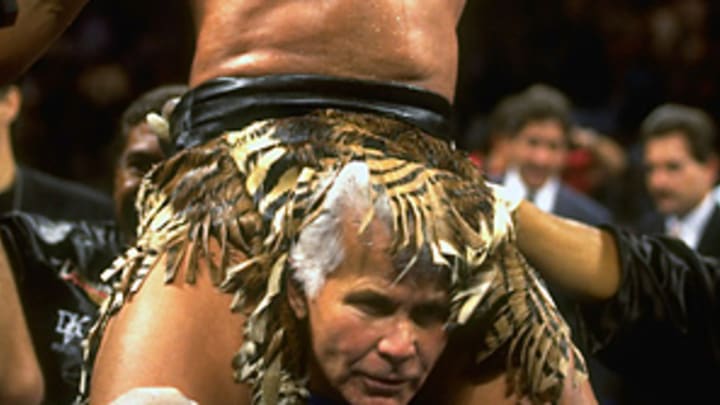Camacho proved you can have lots of style to go along with substance


Hector Camacho's ring ensembles, a matter of fistic wonderment for 30 years, tended toward the bizarre, if not outright obscene. There were loincloths, tassels, spangles, beads -- you name it. It was as if he'd just gotten hold of an informercial Bedazzler and spent training camp in a kind of fashion frenzy, sparring proving too boring. No boxing trunks for him, not when a statement of style could be made.
The trunks, when that's what they were (there was a kind of diaper once), made only part of the outlandish presentation. He had a cherubic face, with a grin that the word mischievous was made for. And his hair, with a carefully coiled forelock, had the look of some serious preparation. He was boxing's first -- wait, its only -- metrosexual. The impression, overall, was generally eye-popping, when not altogether blasphemous.
So you might be forgiven if you doubted his nickname, assuming it was more a matter of rhyme than substance. Macho? Macho Camacho? In that getup?
But believe us when we tell you, that little dandy was tough. Camacho, who died Saturday at the age of 50, four days after being shot in the face near his birthplace of San Juan (a companion, whose car Camacho was sitting in, was also killed; bags of cocaine were found inside), may not have been a brawler, or even a very big puncher. He was a comparatively light hitter who dazzled with footwork (reviews of his lesser bouts sometimes used the qualifier balletic) instead of firepower. But over those 30 years Camacho never ducked a fighter and, while ducking punches, was never knocked out.
Younger boxing fans may only recall his career-ending losses, bouts when his name was more valuable than his ring potential. Oscar De La Hoya, then just 24, got over on Camacho in 1997, when the fighter was already 35. A young and spry and very dangerous Felix Trinidad had gotten to him in 1994 and Julio Cesar Chavez, at a time when he was undefeated in 81 fights, decisioned him in 1992. By then Camacho had been well-used (he'd fought an incredible 88 bouts altogether, his record 79-6-3) and was still in action on charisma alone; nobody sold fights better than Camacho.
But older fans will remember him as a ghost in the ring, impossible to hit, fast and accurate punches coming from nowhere, as he tore through high-quality opponents like Edwin Rosario, or Greg Haugen, Bazooka Limon, Sugar Ray Leonard and Ray Mancini. Dangerous people, all of them. Not everyone appreciated his style, which featured an awful lot of retreat for a man called Macho, but nobody could have doubted his courage when it came to making matches. It paid off in championships in four divisions, featherweight to light-welterweight, and an enduring reputation as a Hall of Fame caliber boxer, although that case became increasingly harder to make.
That's because his style long ago overtook his substance, and his extracurricular antics, with several appearances on a police blotter, will no doubt complicate his resume. Long after he'd won his last title, he once tried to burgle an electronics store, high on Ecstasy. And, for that matter, this wasn't his first shooting -- a year ago he was shot three times in San Juan, in what he described as a car jacking.
But he'd always been a bit of a scamp, growing up in Spanish Harlem (he left Puerto Rico when he was four), getting in all sorts of trouble. He once said he'd been expelled from six schools by the time he was 15. He was a serial car thief and once spent a stint in Riker Island before falling under the influence of a teacher named Patrick Flannery, who smoothed out some of that irrepressible flamboyance and guided him toward boxing goals. It was Flannery, actually, who decided on the nickname Macho, but only when the fighter was about to be recognized as Psycho, a nickname preferred by all his friends at the time.
If it turns out that Camacho had circled back to those early troubled times -- you're no longer a scamp when you're doing the same nonsense at 50; what are you doing in a parked car with 10 bags of cocaine and why would people be shooting at you? -- that would be a shame. It would no doubt reduce the glow of his stardom, all those exciting and preposterous years in between, and possibly argue against a career that was near great, a steady and deliberate insistence upon entertainment that really was great.
We hope not. We hope the circumstances of his death don't prove his life a lie. That would be a shame. Because, man, don't let anyone tell you different: He was an awful lot of fun, for an awful long time.
